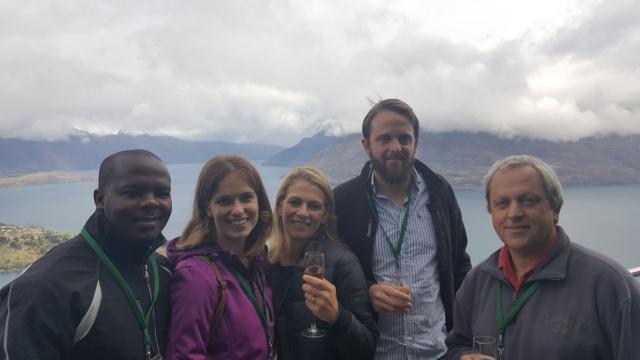
Four members of the Centre for Biological Control (CBC), Associate Prof Julie Coetzee, Dr Grant Martin and two PhD students, Samuel Motitsoe and Rosali Smith recently attended the 15th International Symposium on Aquatic Plants (ISAP), from the 18th to 23th February 2018.
This time ISAP, was hosted by the National Institute of Water and Atmospheric Research (NIWA) in collaboration with other research institutions and to mention a few, Aquatic Plants Management Society, Aquatic Ecosystem Restoration Foundation and Ministry of Primary Industries in Queenstown, New Zealand. The conference was divide into three main research themes involving the use of indigenous aquatic plants for; i) Biodiversity, Conservation and Bio-monitoring of freshwater systems, ii) Ecosystem response and restoration post disturbance and iii) the management of invasive aquatic plants in natural areas.
Considering the long history of aquatic plant invasion and biological control of invasive aquatic plants in South Africa, this was an important platform to establish how other countries deal with invasive species, share current/future research development through novel research and forge new collaborations ventures for the better of the environment. The conference was attended by delegates from Europe, Asia, America, Australia and Africa. The CBC team presented five oral presentations and one poster from different scopes of aquatic plant research done here at Rhodes University. This included a review on aquatic plant invasions in South Africa, management strategies, ecosystem benefits produced by biocontrol and the effects of global climate change on the physiology of submerged aquatic plants.
The conference included fieldtrips to Lakes Wanaka and Dunstan, where invasive aquatic plants have had major impacts on the Clutha River systems. One of the major invaders was Lagarosiphon major, a native species to South Africa. Again, this might an opportunity to work with Aquatic ecologists and Biological control scientists from New Zealand and South Africa respectively to compact the presence of this submerged aquatic weed.
In addition to attending ISAP, members of the CBC did some sightseeing before and after the conference. This included a visit to Wellington museum, a trip down the west coast of the South Island and birding at Tiritiri Matangi Island off the coast of Auckland. “It truly was an amazing experience, the people are friendly, the culture is rich, and the environment is breath-taking. We were once again reminded that what we do here at the CBC is really important, not only for South Africa’s ecosystems, but for the world, which includes the beautiful Lakes of New Zealand”, said members of the CBC.
